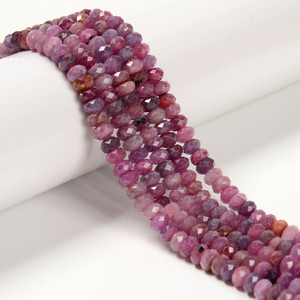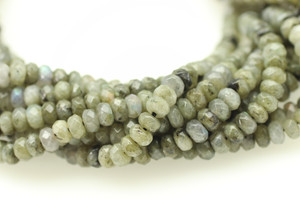
Onyx, Black, Dyed, Faceted Rondelle, One 6x4mm Strand
Beauty in the BeadOnyx, Black, Dyed, Faceted Rondelle, 6x4mm
One strand 15 to 16 inches long
6x4mm rondelle strands have 85 to 90 pieces
Onyx primarily refers to the parallel banded variety of the silicate mineral chalcedony. Agate and onyx are both varieties of layered chalcedony that differ only in the form of the bands: agate has curved bands and onyx has parallel bands. The colors of its bands range from black to almost every color.
Commonly, specimens of onyx contain bands of black and/or white and this banded agate is usually natural and not dyed. Much of what is referred to as "black onyx" is gray chalcedony that has been chemically treated to be a rich black. The gray stone can be saturated with a mineral solution, or it can be immersed for a prolonged period in a sugar solution and then heated to carbonize the sugar.
Onyx comes through Latin and Greek, meaning "claw" or "fingernail". Onyx with colored or white bands can sometimes resemble a fingernail.
Onyx is a gemstone found in various regions of the world including Yemen, Uruguay, Argentina, Australia, Brazil, Canada, China, Czech Republic, Germany, India, Indonesia, Madagascar, Latin America, the UK, and various states in the US.
Hardness 6.5-7
The source of these beads is Uruguay, and they are cut, drilled and polished in China.
These beads are dyed with the introduction of coloring agent into a gemstone to give it new color, intensify present color or improve color uniformity.








